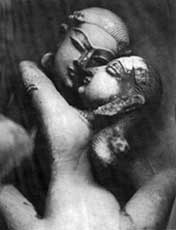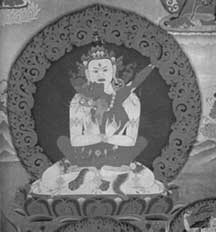|
|
|

|
KUNDALINI
TRANSFORMATION
OF SEXUAL ENERGY |
|
|
|
| In the process of
self-realization the highest goal, identified with the arousal of
Kundalini, is recognized as a microcosmic version of the feminine power of
Sakti. The tantrikas identify the power of Sakti with Cosmic Consciousness,
since she projects the biunity of male and female principles |
|
| In order to
realize this, the discipline of Tantra-asanas (sexo-yogic postures) has
developed into a formidable series of psycho-physical practices requiring the
same type of discipline as meditation. According to tantra, the Kundalini Sakti
can be aroused by the practice of tantra-yoga-asanas, as it asserts: 'One must
rise by that by which one may fall.' What on the cosmic plane is fusion of
polarities is, on the biological level, the sexual union of asana - not sexual
'intercourse' as commonly and wrongly stated. |
|
| Through the ages,
the sex act has been generally associated with procreation or gross physical
satisfaction. Tantrikas, however, realized immense potentiality of sex energy,
and through tantra-asanas, transformed the energy of sex and freed it to a
plane of cosmic awareness. Sex is seen as divine in itself, and a source of a
vital energy capable of acting with tremendous force on the physio-psychic
state which in turn reacts on the higher cosmic plane. |
|
| In Kundalini-yoga
the kinetic flow of Kundalini Sakti, which in the ordinary course is in a
downward direction, is made to reverse to an upward flow, finally to unite it
with Siva, Cosmic Consciousness. To this end, the physiological functions of
the body also undergo progressive transformation. |
|
| The ritual of
tantra-asana is performed with a partner of the opposite sex. The female
participant is seen as the reflection of Sakti, the dynamic female principle of
the universe. The 'devout woman' epitomizes the entire nature of the eternal
feminine. Prior to the commencement of the ritual, a choice of environment and
determination of propitious time and hour, are made with the help of a guru. It
is ideal to have initiation from a Bhairavi (female guru). Tantrikas stress the
need to perform rituals in solitary places in an atmosphere free from
disturbance and pollution. The acts of bathing, dressing, sitting for worship,
offering of flowers and other ritual ingredients, along with rities like nyasa
and bhuta-sudhi (purification of body and elements) are performed to prepare
the right at mosphere. |
|
| In the Pancha-makara rite, the
nude female worshipped is no longer regarded as flesh and blood but as a
goddess, as Sakti who embodies the fundamental forces of the cosmos. 'The
transference of divinity is not something which is detached from the real but
is within the reach of experience. The man and the woman both are parts of a
drama to which they conform in perfect lucidity. Their interplay is a
complementary movement of thought and feeling; there is no place for
abstraction here, but only constant reference to a tangible human condition.
Hence the experience of the transubstantiation of a woman into a goddess is
viewed as a very special revelation of reality which can be seen, felt, and
apprehended in no other way than what it is. |
 |
|
|
| The man and woman
encounter themselves in one another; in doing so more completely does one
relate to one's inner self. This continuous activity of 'seeing' into one
another through the various ritual acts climaxing in sexo-yogic-asana plunges
the group into an anonymity in which personal ego-sense is dissolved for the
acceptance of the common goal. By the process of ritual projection, the adepts
are imbued with divinity until both the make and female, who represent the
dialectical principles, achieve an existential awareness of unity similar to
the symbol of the circle: " So ' ham : I am He" or " Sa ' ham : I am She", for
"There is no difference between Me and Thee." |
|
| Sexual energy is
also tapped through Hatha-yoga and other processes such as Padmasana,
Siddhasana, Yoni asana, Rati asana, and by means of certain mudras, the most
important being Vajroli, Sahajoli, Yoni, Khechari, Asvani and Mahamudra.
Through bandhas, contraction of the pelvic region is also possible, the most
effective being the Uddiyana and Mula-bandha. |
|
 |
Asana is meant for the control
of the body and mind, to permit the free flow of psychic forces through the
physiological mechanisms. It is a unitive, contemplative way, an altered state,
through which a new reality evolves, a new unit comes into existence in which
the old two are lost. 'Sexualtiy and spirituality become two ends of one
energy.' As Rajneesh remarks: 'Tantric sexual union is falling in love with the
Whole Cosmos, it is a total surrender to the Whole Cosmos.' In surrendering we
become feminine, the feminine depths of our psyche then dissolving,
transcending - a total |
|
| experience of
oneness - and a tremendous energy is released. From the tantric point of
view, the consummated human being is man and woman fused into a single unit.
When the idea of basic unity, that the two are inseparable, emerges, the state
of ananda, of infinite joy or perpetual bliss, is reached. This state of bliss
is the closest approximation one may experience to the state of liberation. The
inner life-force is aroused to its full potential through the mystic process of
awakening the Kundalini Sakti. |
| One who has
attained transformation, a spiritual rebirth, has no more desires. All external
aids become symbols of phases and forces. They are no more than 'links' of
different parts of the whole, and all the means that we require to reach the
ultimate goal, however high, lie within us. "What need have I of an outer
woman: I have an inner woman within myself," as tantra says. When roused,
Kundalini, the 'inner woman', shines like 'millions of lightning flashes' in
the centre of the sadhaka's body. He then thinks that he himself is shining
like everything that is reflected. He looks upon the entire objective world
that is reflected as surging within him.' |
|
| Sometimes the use
of psychedelic preparations is prescribed to attain the desired result. Swami
Satyananda's remarks on this method are pertinent. Another method of
awakening according to Yoga is through herbs. In Sanskrit, the word is
Aushadhi, but it should not [be taken to] mean drugs. Through herbs either the
partial or the fuller awakening can be be brought about; either the awakening
of Ida or Pingala, or the awakening of Sushumna which means the entire, total
awakening... That is known as Aushadi. But it is also said that the herbs which
should be used to awaken this potentiality, or this life-force in man, should
be understod or should be got only through the Guru, not without a Guru.
Because there are certain herbs that awaken Ida and there are others that
awaken Pingala only; and there are those that can even suppress both of these
two, so that you can go to the mental asylum very quickly! so Aushadhi or the
herbal awakening is a very risky, a quick but unreliable method. It should only
be got from one who is a very reliable person, and who knows the science very
well.' |
|
| 'In the case of
drug-induced states - especially the first few instances - the trip is likely
to be highly uncontrolled. The individual will find himself hurled into some
far-flung region of inner space, with little chance to absorb or even notice
the intervening regions. The drug takes his awareness, as it were, and flings
it out to an unfamiliar realm of consciousness. Without adequate preparation,
the traveller feels totally disoriented... Finally, with drugs, the trip is of
limited duration. One always comes down, or comes back.' |
|
| Some Western
observer has written of the question of drug use: 'Persons who practice mantra
meditation have been found to show evidences of increased integration in their
life activities. For example, one study reports that eighty - three percent of
a large group of drug users practising this kind of meditation gave up the use
of drugs. |
|
|
|
|
|
|